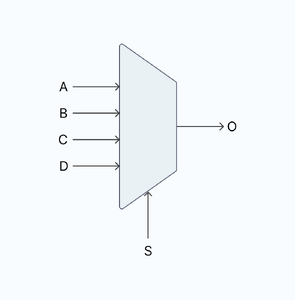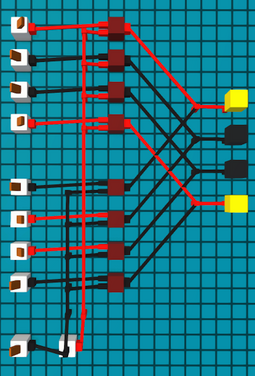Multiplexer: Difference between revisions
Appearance
FoxFireFive (talk | contribs) mNo edit summary |
Lawrziepan (talk | contribs) mNo edit summary |
||
| Line 1: | Line 1: | ||
[[File:Multiplexer Diagram.png|300x300px|A diagram of a multiplexer|alt=A diagram of a multiplexer|thumb]] | [[File:Multiplexer Diagram.png|300x300px|A diagram of a multiplexer|alt=A diagram of a multiplexer|thumb]] | ||
[[File:Simpler Multiplexer Circuit.png|alt=A diagram of a simple multiplexer|thumb|376x376px|Example of a simple multiplexer.]] | [[File:Simpler Multiplexer Circuit.png|alt=A diagram of a simple multiplexer|thumb|376x376px|Example of a simple multiplexer.]] | ||
A multiplexer | A multiplexer, sometimes referred to as a MUX, is used to select from input data. A multiplexer is an essential piece of any circuit in Logic World. There are many different ways to build a multiplexer. | ||
== Behavior == | == Behavior == | ||
Latest revision as of 09:18, 18 October 2025


A multiplexer, sometimes referred to as a MUX, is used to select from input data. A multiplexer is an essential piece of any circuit in Logic World. There are many different ways to build a multiplexer.
Behavior
A multiplexer has at least 2 inputs of any bit size, and a select input that is either:
- A bit array with a length of the number of inputs, and whichever bits are ON, their corresponding inputs get bitwise-ORed to the output.
- A value which corresponds to an input to send directly to the output.
Uses
Multiplexers are very versatile, and can be used for many circuits. Multiplexers are commonly used for:
- Selecting between registers to use in operations in a CPU.
- Indexing memory.

